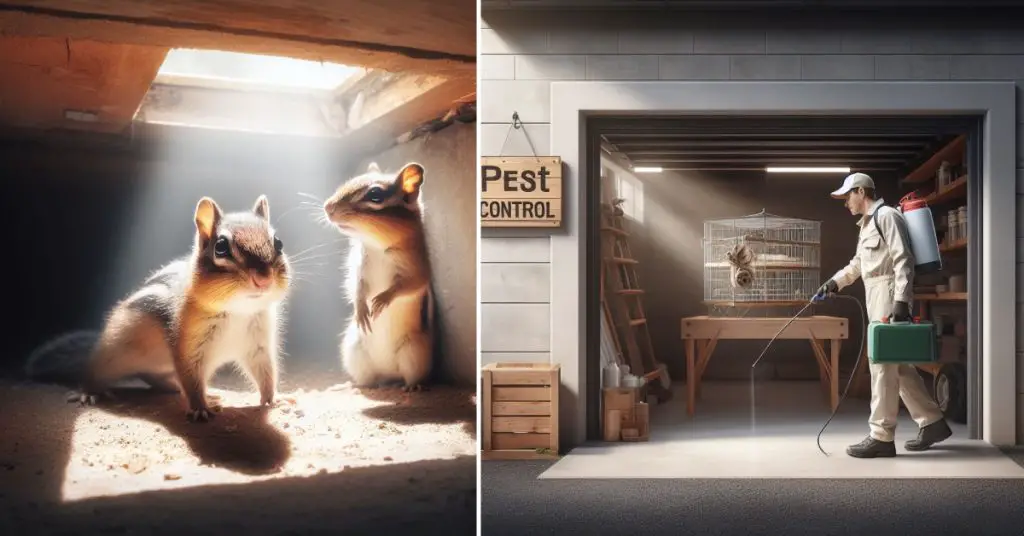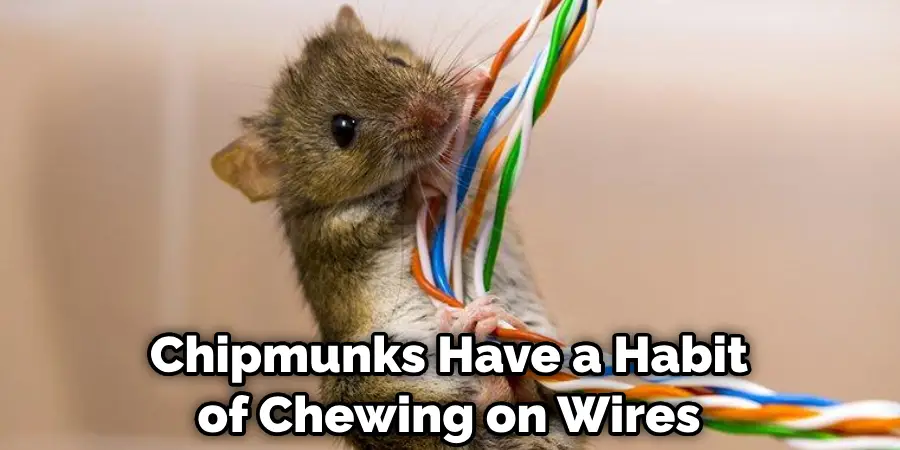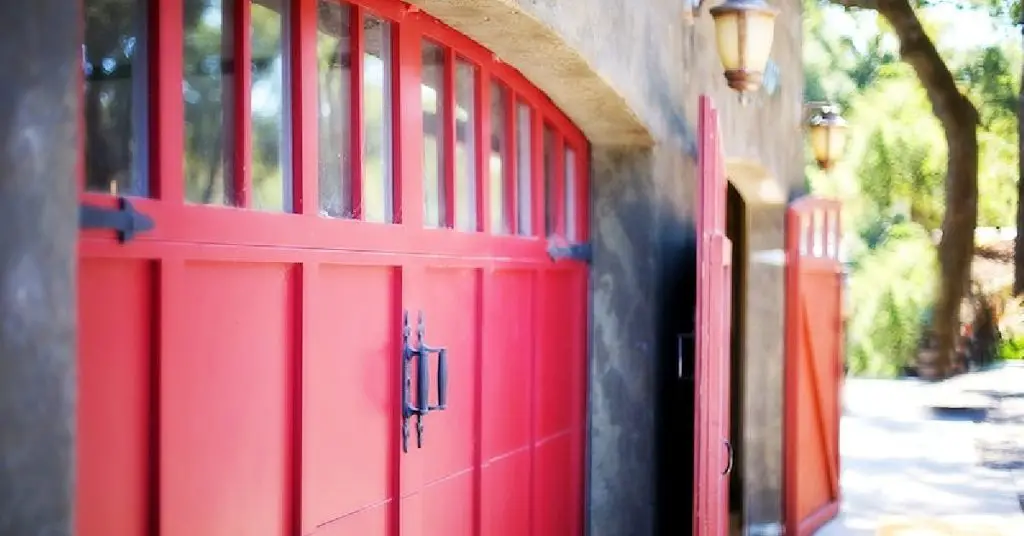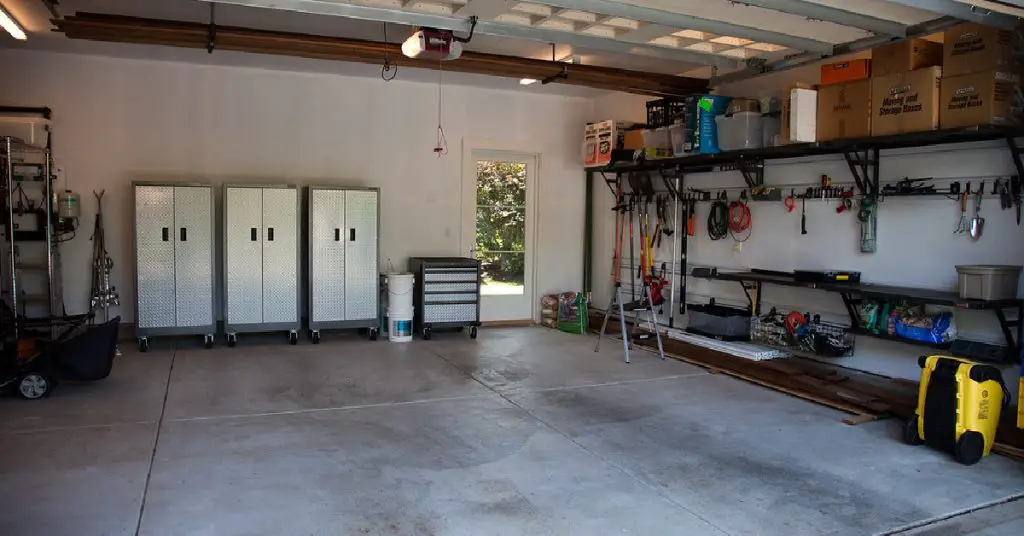If you’ve ever had chipmunks invade your garage, you know how frustrating it can be. These adorable rodents may be cute in the wild, but when they start burrowing under your flowerbeds, eating your vegetables, and making a mess in your garage, they quickly become a nuisance. Fortunately, there are effective methods for how to keep chipmunks out of garage using simple and natural methods. In this comprehensive guide, we’ll explore different strategies and techniques to help you reclaim your garage from these pesky critters.

Key Takeaways:
- Seal entry points and remove food sources to deter chipmunks.
- Use strong scents like cayenne pepper, peppermint oil, or ammonia as repellents.
- Consider physical barriers, ultrasonic repellents, and creating an unpleasant environment.
- Seek professional help for persistent infestations.
Understanding Chipmunks and Their Habits
Before we delve into the methods of keeping chipmunks out of your garage, it’s essential to understand these creatures and why they’re attracted to your garage in the first place. Chipmunks are small rodents that belong to the squirrel family. There are 24 different species of chipmunks in the United States, with the eastern chipmunk being the most common species found in the eastern part of the country. Chipmunks are known for their burrowing skills and can create tunnel systems up to 30 feet deep. They spend most of their day foraging for food, which includes bulbs, nuts, seeds, berries, mushrooms, insects, bird eggs, and fungi. They are not picky eaters and will consume a variety of food sources.
During the winter, chipmunks do not hibernate but spend most of their time sleeping in their burrows. If the temperatures rise during the winter, they may venture out to forage for additional food. This means that chipmunks can be active in your garage throughout the year, especially if there are warm days.
The Dangers of Chipmunks in Your Garage
While chipmunks may seem harmless, they can cause significant damage to your garage and its contents. Some of the potential problems caused by chipmunks include:
Damage to Property: Chipmunks are skilled burrowers and can create tunnels underneath patios, stairs, foundations, and other structures in your garage. This can weaken the integrity of the foundation and cause costly damage.
Chewed Wires: Chipmunks have a habit of chewing on wires, including those in your car. This can lead to electrical malfunctions and potentially costly repairs.
Contamination: Chipmunks can leave droppings and urine in your garage, which can contaminate surfaces and pose a health risk.
Food Theft: If you store birdseed or pet food in your garage, chipmunks can raid these food sources, leading to wastage and attracting other pests.
Given these potential dangers, it’s essential to take proactive measures to keep chipmunks out of your garage.
You Can Check It Out to Keep Mice Out of the Garage.

7 Effective Methods for How to Keep Chipmunks Out of Garage
Below, we’ll explore effective methods and strategies to achieve this goal.
1. Seal Entry Points
The first step in keeping chipmunks out of your garage is to identify and seal all potential entry points. Chipmunks can squeeze through small openings, so it’s essential to inspect your garage for any gaps or cracks thoroughly. Common entry points include gaps around doors, windows, vents, and utility lines.
Use caulk or weatherstripping to seal these openings and prevent chipmunks from gaining access. Pay special attention to areas where utility lines enter your garage, as chipmunks can easily slip through these small gaps.
Additionally, check the garage door for any gaps along the sides or bottom. Install a rubber seal or weatherstripping to ensure a tight seal when the door is closed.
2. Remove Attractants
Chipmunks are attracted to places with readily available food and shelter. By removing these attractants, you can discourage chipmunks from entering your garage in the first place.
Start by organizing and decluttering your garage. Remove any unnecessary items that provide hiding spots for chipmunks. Keep the garage clean and free of debris, as clutter can offer an ideal environment for chipmunks to nest.
If you store birdseed or pet food in your garage, make sure it is stored in airtight containers to prevent chipmunks from accessing it. Clean up any spilled food promptly and avoid leaving food sources exposed.
3. Repel Chipmunks with Strong Smells
Chipmunks have a strong sense of smell, and certain scents can deter them from entering your garage. Here are some effective scents that chipmunks dislike:
Cayenne Pepper: Sprinkle cayenne pepper around the perimeter of your garage or in areas where chipmunks have been spotted. The strong scent will irritate their senses and discourage them from entering.
Peppermint Oil: Soak cotton balls in peppermint oil and place them around your garage. The pungent smell of peppermint will repel chipmunks.

Ammonia: Soak rags in ammonia and place them in strategic locations in your garage. The pungent odor will deter chipmunks from entering.
Mothballs: Place mothballs in mesh bags and hang them in areas where chipmunks are likely to enter. The naphthalene odor of mothballs is unpleasant to chipmunks and can keep them away.
Predator Urine: Sprinkle predator urine, such as fox or coyote urine, around the perimeter of your garage. The scent of a potential predator will make chipmunks think twice before entering.
Remember to reapply these scents regularly, as they may dissipate over time. Be cautious when using strong-smelling substances and ensure proper ventilation to avoid any adverse effects.
4. Use Ultrasonic Repellents
Ultrasonic repellents emit high-frequency sound waves that are inaudible to humans but are irritating to chipmunks and other rodents. These devices can be plugged into an electrical outlet in your garage and create an uncomfortable environment for chipmunks, encouraging them to leave.
Choose an ultrasonic repellent designed explicitly for chipmunks and follow the manufacturer’s instructions for optimal effectiveness. Keep in mind that ultrasonic repellents may not be as effective if your garage has a lot of obstructions or if chipmunks have already established nests.
5. Install Physical Barriers
Physical barriers can be an effective way to keep chipmunks out of specific areas of your garage. Here are a few options to consider:
Hardware Cloth: Install hardware cloth over vents, window openings, and other openings where chipmunks can enter. This fine mesh will prevent chipmunks from squeezing through.
Barriers for Utility Lines: Use metal flashing or collars around utility lines entering your garage to prevent chipmunks from accessing openings.
Fencing: If chipmunks are entering your garage through gaps in the foundation, consider installing a barrier of wire mesh or fencing around the perimeter of your garage. Bury the bottom of the fence several inches underground to prevent burrowing.

6. Create an Unpleasant Environment
Chipmunks are attracted to warm and cozy environments. By making your garage less inviting, you can encourage them to seek shelter elsewhere. Here are some strategies to create an unpleasant environment for chipmunks:
Reduce Temperature: Ensure proper ventilation and airflow in your garage to keep it cool and discourage chipmunks from seeking warmth.
Eliminate Water Sources: Fix any leaks or water sources in your garage, as chipmunks are attracted to areas with access to water.
Use Noise and Vibrations: Place a radio or other noise-producing device in your garage to create vibrations and disturbances that chipmunks find uncomfortable.
Motion-Activated Lights: Install motion-activated lights in your garage to startle chipmunks and deter them from entering.
7. Seek Professional Help
If you have tried various methods but still struggle with a chipmunk infestation in your garage, it may be time to seek professional assistance. Pest control professionals have the expertise and knowledge to remove chipmunks and prevent future infestations effectively. They can assess your garage, identify entry points, and provide targeted solutions to eliminate chipmunks.
Additionally, local wildlife or animal control agencies may assist with trapping and relocating chipmunks if necessary.
You Can Check It Out to Get a Possum Out of Your Garage.

FAQs About How to Keep Chipmunks Out of Garage
What Do Chipmunks Hate the Most?
Chipmunks dislike the scent of garlic, vinegar, pepper, mint, cedar, and various plants and essential oils. They also dislike overwhelming scents like vinegar, which can be used as a repellent by spraying it in areas where chipmunks are present.
What Will Keep Chipmunks Away?
Chipmunks have a strong sense of smell, so scents like garlic, vinegar, pepper, mint, cedar, and certain plants and essential oils can deter them. Peppermint, citrus, cinnamon, eucalyptus, and garlic are particularly effective in repelling chipmunks.
What Are Chipmunks Most Afraid of?
Chipmunks are most afraid of predators such as bobcats, raccoons, snakes, birds of prey, and even domesticated cats and dogs. When chipmunks sense danger, they rely on their running skills to flee and find secure hiding spots. They are small but swift creatures that can quickly escape from potential threats. Chipmunks are also territorial and will make loud noises to drive away predators or other chipmunks encroaching on their territory. It is important to note that chipmunks do not understand shouting or punishment, and such actions can make them more nervous and scared.
Conclusion
Keeping chipmunks out of your garage requires a combination of prevention, deterrents, and proactive measures. By sealing entry points, removing attractants, repelling chipmunks with solid smells, installing physical barriers, creating an unpleasant environment, and seeking professional help if needed, you can reclaim your garage from these pesky critters. Remember to be patient and persistent, as it may take time to deter chipmunks completely. With these strategies in place, you can enjoy a chipmunk-free garage and protect your property from damage.


